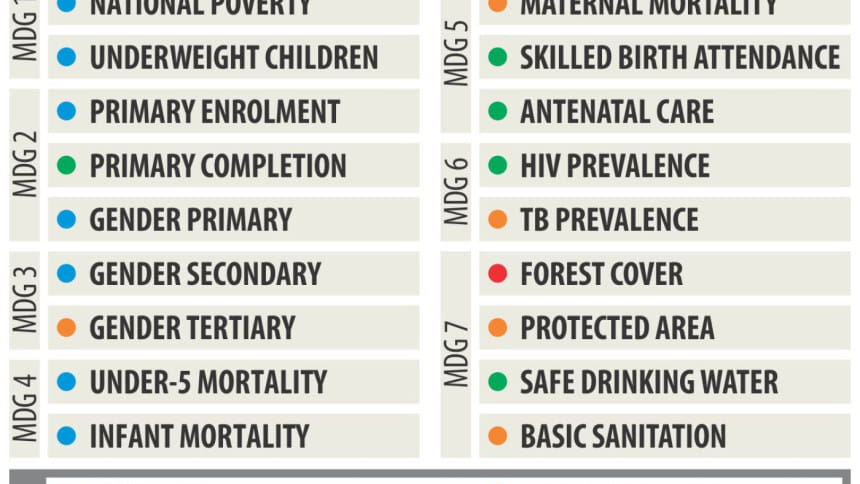Move forward on SDGs with own funds: analysts

Bangladesh should get ready to implement the sustainable development goals on its own, as external resources might not be available as expected, just like in the case with the millennium development goals, experts said yesterday.
Developing and least developed countries, including Bangladesh, did not get financial assistance as promised by the rich countries, according to the final evaluation report on the MDGs that was launched at the National Economic Council auditorium in Dhaka.
“We got only 40 percent of the promised funds,” said Shamsul Alam, a member of the General Economics Division (GED) of the planning commission, who led the task of preparing the report.
Zahid Hussain, lead economist of the World Bank in Dhaka, said Bangladesh has no other way but to look at generating more revenue from internal resources, given the current international scenario.
“It is good if foreign assistance comes. But we have to be self-reliant.”
Planning Minister AHM Mustafa Kamal called for boosting investment in development of both physical and non-physical infrastructure.
“We need to raise more revenue from domestic resources. The domestic sector is no longer small.”
The supply of electricity has to be ensured to attract investors, he added. “Hopefully, there will no electricity shortage within two years.”
The report shows that Bangladesh has recorded remarkable progress in the areas of poverty alleviation, food security, primary school enrolment, gender parity in primary and secondary level education, infant and under-five mortality ratio, immunisation coverage, and incidence of communicable diseases.
“Overall, we have done quite well. We are one of the top 18 MDG achievers. Strong political will, commitment and a planned path of development helped attain most of the MDGs targets,” said Alam.
Official development assistance (ODA) remains critically important for countries like Bangladesh with limited capacity to raise public resources domestically, he said.
Between 1990-91 and 2014-15, the disbursement of ODA as a proportion of Bangladesh's GDP has fallen from 5.59 percent to 1.56 percent, according to the evaluation report.
Prof Alam said the GED is working on how much money Bangladesh would require to implement the SDGs, and it will be known in January.
The policymaker said the government has devised the Seventh Five-Year Plan keeping in mind the unfinished MDGs.
Hussain of the WB said Bangladesh's grassroots level capacity in achieving development goals is much stronger compared to what is believed.
Bangladesh can bring its extreme poverty rate down to nearly zero by 2030 either by accelerating GDP growth to 9 percent a year, or by maintaining its recent growth rate while taking steps to make growth more inclusive, he said.
On the challenges lying ahead, the macroeconomist said the government will have to pay heed to identifying priorities, implementation, financing and coordination among ministries.
“The government has taken the right direction on coordination among different ministries by identifying which ministries will be responsible for reaching which goals,” he said, calling on the government to ensure narrowing the data gap to properly monitor progress on SDGs implementation.
The GED has conducted a preliminary data gap analysis to monitor the SDGs and found that out of 231 indicators, data on only 63 indicators are available in the existing data generating system, and a further 67 can be generated by modifying existing census, survey and management information systems.
Sudipto Mukerjee, country director of UNDP Bangladesh, said Bangladesh is lauded as a beacon of hope in South Asia in case of the MDGs.
The country has not only achieved many of the targets by the deadline, but many targets were reached much ahead of 2015, he added.
Going forward, and the SDGs provide opportunity to the country to ensure that no one is left behind, he said.
Mukerjee pointed out two specific areas that may pose challenges to Bangladesh. One challenge will come from the environment as Bangladesh is one of the most challenged countries when it comes to climate change and disasters.
Urban centres, which account for 60 percent of the country's gross domestic product and are home to 25 percent of the population, also face disaster risk, he said. “If disasters hit the urban centres, it will have a major impact on the entire economy.”
The UN official reiterated his agency's continuous support in helping the country achieve its development objectives.
Mashiur Rahman, economic affairs adviser to the prime minister, said Bangladesh has shown how a country can achieve its development goals despite various challenges.
If the contribution of the informal sector is taken into consideration, economic output might grow by 1 to 1.5 percentage points to 8 percent, Rahman added.
Rizwanul Islam, a former special adviser of the International Labour Organisation, thanked the government for publishing the challenges it is facing along with the rosy picture of the MDGs implementation.
“It is heartening that the government is aware of the challenges. Now the desire and public policies will have to translate into action.”
There has to be more concerted effort to attain the SDGs, he said. “Poverty alleviation and reducing inequality will require more attention.”
Commerce Minister Tofail Ahmed said Bangladesh has become a development model, shrugging off past assertion that the country might be a model of the poor countries.
“We have not been able to achieve all targets on the MDGs. But we are on track.”

 For all latest news, follow The Daily Star's Google News channel.
For all latest news, follow The Daily Star's Google News channel. 



Comments